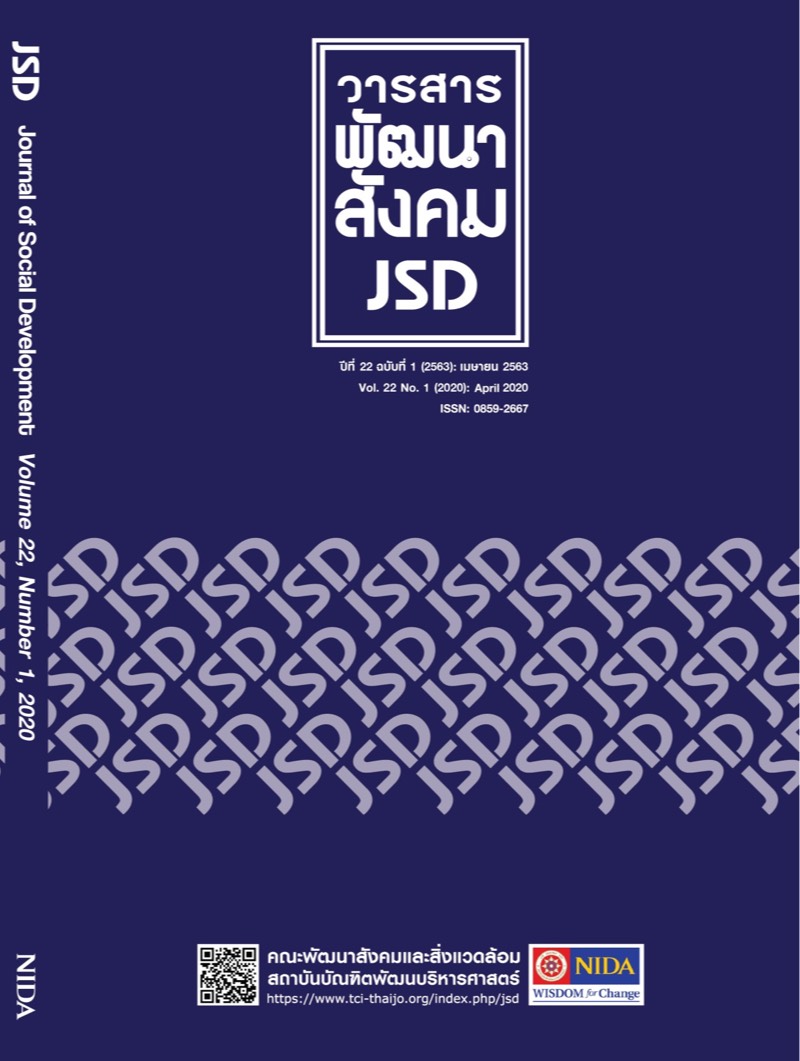Effects of Income and Consumption from Spiritual Culture of Ta-khian Goddess in Chaophraya River Riparian Area
Main Article Content
Abstract
Article Details
References
Asanok, L., Yotapakdee, T., Kamyo, T., & Norsangsri, M. (2018). Ecology of big tree for conservation along Cho Praya River riparian area Report [in Thai]. Bangkok: PTT Public Company.
Chattun, K., & Sirivong, P. (2017). An origin for interpreting and the consumers behavior in purchasing illegal lottery o felderly in Tha-Yang district, Phetchaburi [in Thai]. Paper presented at 8th Rajamangala University of Technology National Conference, Bangkok (pp 1419-1426). Bangkok: Rajamangala University of Technology.
Duangwiset, N. (2017). Ta-khian Goddess: Bodily Feminization of Sacred Superstition in Thai Consumer Culture [in Thai]. Journal of Social Sciences, Naresuan University, 13(2): 65-98.
Harnsri, N. (2017). Saving of Local Households Thailand [in Thai]. Retrieved from https://www.gsb.or.th/GSB-Research.
Khongsong, S. (2009). The Characteristic of Lottery - Buying of Slum People in Bangapi District, Bangkok [in Thai]. Master of Arts: Social Development, School of Social and Environmental Development, National Institute of Development Administration. Bangkok.
Korchamkang, N., Seubleela, C., & Boonchareon, S. (2015). Behaviors that Influence Purchase Illegal Lottery of People in Nakhon Ratchasima [in Thai]. Paper presented at 2nd Nakhonratchasima College National Conference, Nakhonratchasima (pp 546-551). Nakhonratchasima: Nakhonratchasima College.
Millennium Ecosystem Assessment. (2005). Ecosystems and human well-being: synthesis. Washington DC: Island Press.
Phannarat, N. (2016). The meaning of the boat nymph of local fishermen, Songkhla province [in Thai]. Journal of Humanities and Social Sciences, Thonburi University, 10(23), 33-40.
Piwpard, K., Udompongwattana, K., & Siriwong, P. (2012). Faith and the Vow of a Votive Offering of a Votive Offering to the Goddess Nom Sao, Nom Sao Island District, Sam Roi Yod. Sam Roi Yod District. Prachuap Khiri Khan [in Thai]. Paper presented at 13th Graduate Research Conference, Khon Khan University (1274- 1281). Khon Khan: Khon Khan University.
Pothong, K. (2014). Contemporary Thai Offering. A Thesis Submitted in Partial Fulfillment of the Requirements for the Degree Master of Fine Arts Program in Visual Arts Education Graduate School, Silpakorn University.
Gurusiriratananuwat, P., Rtis, P., Kingnet, J., Losuwan, P., Pranuitsariyaporn,H., Nirotrungsri, P. et al. (2012). The Pledge, Sacrifice: Concept, Principle and Influence on Thai Society. Research Project of Mahachulalongkornrajavidyalaya University, Buddhachinarat Buddhist College
[in Thai]. Bangkok: Mahachulalongkornrajavidyalaya University.
Phaksipaeng, I. & Sonsuphap, R. (2018). Illegal Lottery: Income Security in Thailand [in Thai]. National Defence Studies Institute Journal, 9(1), 82-96.
Pornchokchai, S. (2017). Economy Development by Lottery [in Thai]. Retrieved from https://www.area.co.th/thai/area_announce/area_press.php?strquey=press_announcement2202.htm
Puhom, P. (2018). Saving of Thailand [in Thai]. Retrieved from https://gsb.or.th
Pusaksrikit, T. & Pongsakornrungsin, S. (2014). Semiotics of Superstition toward Government Lottery and Underground Lotery Purchasing Behavior of Thai Consumers [in Thai]. Veridian E-Journal, 7(2): 1348-1361.
Royal Forest Department. (2013). Hopea odorata Roxb. Reforestation Promotion Office [in Thai] Bangkok: Royal Forest Department.
Sirirattananuwut. (2015). Influence of Pledge, Sacrifice in Thai Society [in Thai]. Cultural Approach, 16(29): 19-29.
Songsakul, P. (2018). Lottery of Thailand [in Thai]. Retrieved from https://thestandard.co/lottery-big-source-of-government-revenue/
Vannathepsakul, N. (2011). Illegal Lottery Economy [in Thai]. Bangkok: Thai Health Promotion Foundation.
Varuwanshop. (2017). Price of cultural shopping 2017 [in Thai]. Retrieved from http://www.varuwan.com/
Vora-Sittha, P. (2018). Economic Contribution of Government Spending on Tourism Industry in Thailand [in Thai]. Development Economic Review, 12(2): 37-57.


